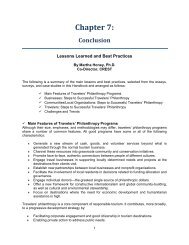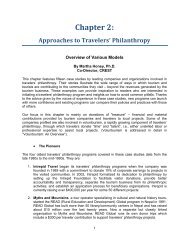Travelers' Philanthropy Handbook - Center for Responsible Travel
Travelers' Philanthropy Handbook - Center for Responsible Travel
Travelers' Philanthropy Handbook - Center for Responsible Travel
Create successful ePaper yourself
Turn your PDF publications into a flip-book with our unique Google optimized e-Paper software.
The dependency I’m talking about takes the recurring <strong>for</strong>m of recipients not taking psychological“ownership” of a project. The well, clinic, or bridge is seen by them as belonging to the donor,not to themselves.So my gift can generate resentment by recipients that I am so wealthy I have extra cash to give,that I make the villagers feel poor, and an uncom<strong>for</strong>table sense that I make them feel dependenton me. In such a situation people may not want to say “thank you” in front of a camera.There was a great cartoon, many years ago, of Egypt’s President Gamal Abdel Nasserreceiving a giant package from Uncle Sam labeled “AID.” Nasser says to Uncle Sam, “Thankyou. Go to hell.” The gratitude and the resentment are both there, mingled together.If no one thanks me <strong>for</strong> my generosity, who is the next person to become resentful? Me, thedonor! I think to myself, “All I asked <strong>for</strong> was thanks. That’s not much, and it was somethingthe villagers could easily have given. They had every reason to be grateful because theyreceived a free good, something they wanted but wouldn’t have gotten if it hadn’t been <strong>for</strong> mygenerosity. What the hell is wrong with these people? If they’re going to act like this, thenthat’s the last time I’ll ever give to a charitable organization helping developing countries.”So now we have resentment on the part of the recipient and the donor. This isn’t a good way toend a story based, initially, on the best of intentions!• Passing the Money and ResponsibilityNow let’s look at another problem. The traveler, by definition, is here today and gone tomorrow,off to another place on a busy itinerary. What stays around is the money that I, the traveler,donate. I and my money are soon parted. But with whom do I leave that money?Naturally I want to leave it in the hands of someone who is trustworthy and isn’t likely to put it inhis or her back pocket <strong>for</strong> private use. The person also has to have some locallyacknowledged authority to spend the money and the ability to track its use so that others don’tmisuse donated funds. And the person has to have some administrative ability to implement aproject, to take it from a pleasant vision to something that actually exists “on the ground.”Someone has to identify the contractors, sign contracts, recruit and train the labor <strong>for</strong>ce. It turnsout that a huge amount of work is involved in project implementation, all of it after I have left thescene and gone on to my next tourist attraction.But in many situations no such person, with all these admirable qualities, exists. Even if thisperson could be found, unless the donation includes reasonable compensation to the agent <strong>for</strong>all this work, there would be no incentive to take the job. Nor may the contractors and subcontractorsand skilled artisans be available locally. They may have to be brought in fromoutside the village and housed nearby, further disrupting the local status quo.Here, I think, the donor has three options. One is to leave the money in the hands of someoneconnected with the tourist industry: the lodge’s owner or the tour operator. A second is toleave it with a village member with recognized status, such as the chief or top elected official.The differences between these two potential recipients are substantial and visible. The <strong>for</strong>meris quite likely a “European,” a white person, and someone who may or may not be a citizen ofthe country. The latter is a “person of color” who is a citizen of the country. The <strong>for</strong>mer is bylocal standards quite wealthy; the latter is not. The <strong>for</strong>mer may or may not know the local185















